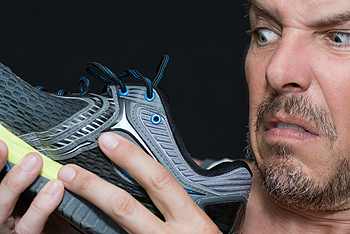 The human body produces sweat as a reaction to an increase in temperature. Since we are warm-blooded creatures, we excrete water through our pores to avoid overheating. However, it is possible for the body to produce more sweat than what is necessary; this condition is called hyperhidrosis. Hyperhidrosis may be caused by thyroid problems, hormonal fluctuation, anxiety, or medical conditions. One of the tell-tale signs of the condition is that it causes the individual to sweat regardless of the environment they are in. Sweat is meant to be a reactive condition, meaning that it occurs as a result of heat. When people have hyperhidrosis, they produce sweat without regard to the temperature. Additionally, it is common for people with the condition to only sweat in certain areas, such as the feet. If you are dealing with sweaty feet and are looking to find a solution, you should contact your podiatrist right away.
The human body produces sweat as a reaction to an increase in temperature. Since we are warm-blooded creatures, we excrete water through our pores to avoid overheating. However, it is possible for the body to produce more sweat than what is necessary; this condition is called hyperhidrosis. Hyperhidrosis may be caused by thyroid problems, hormonal fluctuation, anxiety, or medical conditions. One of the tell-tale signs of the condition is that it causes the individual to sweat regardless of the environment they are in. Sweat is meant to be a reactive condition, meaning that it occurs as a result of heat. When people have hyperhidrosis, they produce sweat without regard to the temperature. Additionally, it is common for people with the condition to only sweat in certain areas, such as the feet. If you are dealing with sweaty feet and are looking to find a solution, you should contact your podiatrist right away.
If you are suffering from hyperhidrosis contact one of our podiatrists of Sutera and Jones Surgical Podiatry. Our doctors can provide the care you need to attend to all of your foot and ankle needs.
Hyperhidrosis of the Feet
Hyperhidrosis is a rare disorder that can cause people to have excessive sweating of their feet. This can usually occur all on its own without rigorous activity involved. People who suffer from hyperhidrosis may also experience sweaty palms.
Although it is said that sweating is a healthy process meant to cool down the body temperature and to maintain a proper internal temperature, hyperhidrosis may prove to be a huge hindrance on a person’s everyday life.
Plantar hyperhidrosis is considered to be the main form of hyperhidrosis. Secondary hyperhidrosis can refer to sweating that occurs in areas other than the feet or hands and armpits. Often this may be a sign of it being related to another medical condition such as menopause, hyperthyroidism and even Parkinson’s disease.
In order to alleviate this condition, it is important to see your doctor so that they may prescribe the necessary medications so that you can begin to live a normal life again. If this is left untreated, it is said that it will persist throughout an individual’s life.
A last resort approach would be surgery, but it is best to speak with your doctor to find out what may be the best treatment for you.
If you have any questions please feel free to contact one of our offices located in Media, Glen Mills, Riddle Memorial Hospital, and Concordville, PA . We offer the newest diagnostic and treatment technologies for all your foot and ankle needs.
